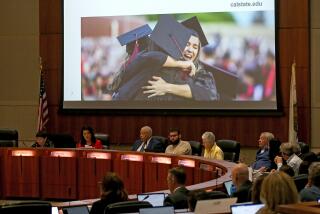State Historical Society Faces Member Revolt Over Fund Crisis
- Share via
SAN FRANCISCO — Alarmed by the California Historical Society’s deepening financial crisis, a group of society members have called for the ouster of the institution’s executive officers.
A group of 70 society members, librarians and state historians gathered Wednesday night to form the Friends of the California Historical Society. The coalition alleged that an “elite clique” on the board of trustees has operated the society in secret and brought the institution to the brink of bankruptcy.
Over the last month and a half, the society has laid off half of its 21-member staff, closed both its library in San Francisco and its history center in Los Angeles and put its 93-year-old Whittier Mansion headquarters up for sale. The society reports $250,000 in debts.
“This institution will never recover until it gets a new board of trustees,” said James Holliday, who served as the society’s executive director from 1970 to 1977 and again from 1983 to 1985.
Nancy Maushardt, president of the board of trustees, disputed the coalition’s allegations, saying that most of its members are loyalists to former executive director Holliday, who she said over-staffed the society and chronically incurred deficits during his tenure.
“I think this particular group has possibly a different philosophy on how the society should be run,” Maushardt said. “I’m a fiscal conservative. I don’t believe in running deficits.”
The coalition said it may take legal action to stop the sale of the Whittier Mansion and other assets that the society’s directors may be considering.
Much of the ire has been focused on Maushardt. Her critics charge that she wrested control from the professional staff and prompted those she felt were disloyal to her to leave. Since Maushardt became president in 1986, the staff turnover has been estimated at more than 200%, critics said.
Critics also charge that Maushardt and other trustees purposely kept the general membership in the dark about major policy decisions.
Maushardt denied that society trustees were keeping secrets from the general membership or that she single-handedly took over operation of the society.
“I believe in consensus. I don’t believe in secrecy and domination,” said Maushardt, adding that she is only one of 22 trustee officers eligible to vote in the society’s decision-making process.
Acknowledging the society’s high personnel turnover rate, Maushardt said many staff members had difficulty adjusting to her efforts to implement fair employment practices guidelines under state law.
The society must liquidate the assets tied up in the Whittier Mansion to set up an endowment fund for the long-term running of the institution, Maushardt said. The society is asking $8.75 million for the 3,500-square-foot mansion.
The society now is without a significant endowment and receives no state funding, Maushardt said. The cost of its operations are completely financed by private donations and membership fees from its 7,500 members.
Maushardt has served for the last 25 years as a board member for Edgewood Children’s Home, which provides care for abused and neglected children.
Donald T. Hata, vice president of the board of trustees and history professor at Cal State Dominguez Hills, defended Maushardt’s management of the society, saying she is a hard-working and conscientious trustee working in the best interest of the society.
Not all those who attended Wednesday’s meeting were in agreement over the need to replace the present board of directors. Others said members should focus their energies on reopening the society’s North Baker Library, a precious tool used by scholars and historians.
The society closed the library because it could not meet its staff payroll, said Nathan Sumner, the society’s executive director. Sumner said the library requires $400,000 annually to operate.
Officially recognized by the state Legislature in 1978 as the keeper of the state’s heritage, the society maintains vast collections of historical documents, photographs and artwork.
More to Read
Sign up for Essential California
The most important California stories and recommendations in your inbox every morning.
You may occasionally receive promotional content from the Los Angeles Times.










